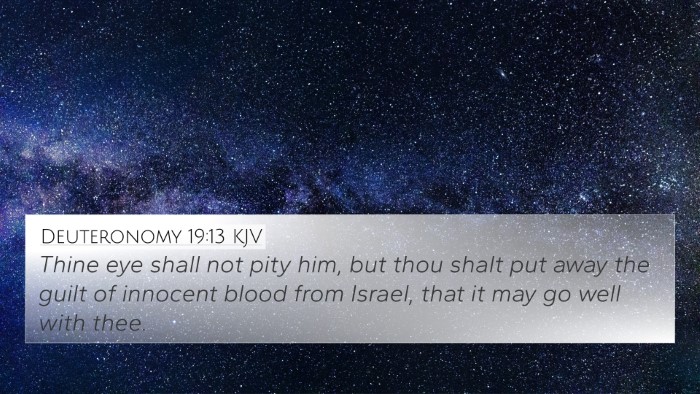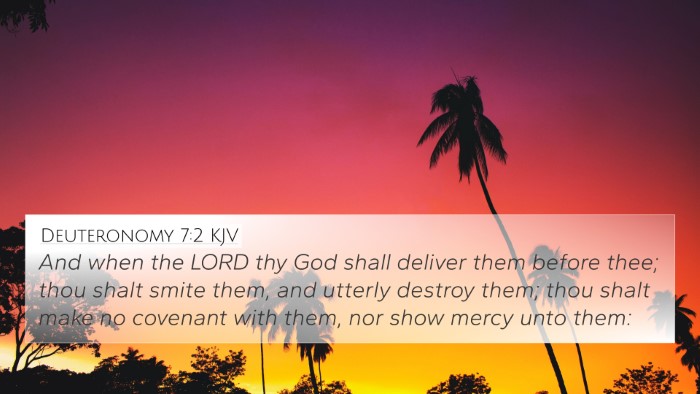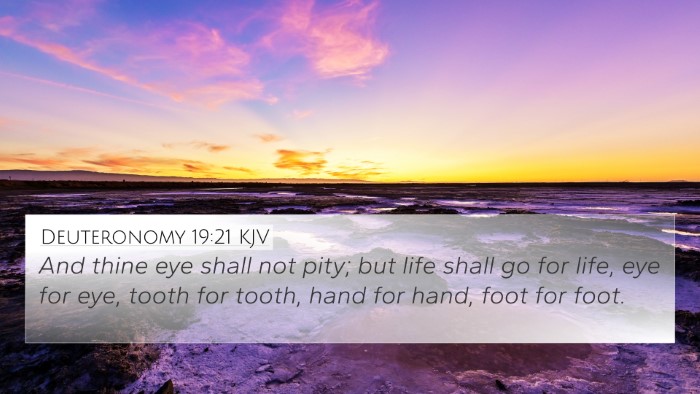Understanding Deuteronomy 25:12
Verse: "Then thou shalt cut off her hand, thou shalt not pity her." (Deuteronomy 25:12)
Contextual Overview
Deuteronomy 25:12 addresses a specific law concerning the treatment of a woman during a physical altercation. This verse underscores a practical application of justice and discipline as prescribed in the Mosaic Law. The context is rooted in ensuring that violence does not go unpunished, while also preserving moral integrity within the community.
Commentary Insights
- Matthew Henry:
Henry emphasizes that the law aims to deter violence and maintain social order. He reflects on the intention behind the law, highlighting the importance of justice intertwined with mercy — noting that while the punishment may seem harsh, it serves as a necessary boundary against lawless behavior.
- Albert Barnes:
Barnes focuses on the severity of the punishment being a reflection of the seriousness of the offense. He discusses the balance of justice and compassion, and how the law was meant to prevent future offenses. The harshness of the measure reflects the need for communal stability in ancient Israel.
- Adam Clarke:
Clarke interprets the verse as indicative of a legal principle designed to ensure accountability for actions. He explores the cultural context of the time, suggesting that such laws were necessary for the preservation of order and respect among individuals.
Thematic Connections
This verse connects to broader biblical themes, such as justice, mercy, and community accountability. It invites discussion about how themes of penal justice reflect God's character and how these laws relate to the New Testament concepts of grace and forgiveness.
Cross-References
- Exodus 21:24: "Eye for eye, tooth for tooth..." - A principle of equitable justice in ancient Israel.
- Leviticus 24:19-20: Details the laws of retaliation, reinforcing the concept of proportionality in punishment.
- Deuteronomy 19:21: Discusses the importance of justice and how it should be applied without pity for the offender.
- Romans 12:19: Reflects on God's justice and vengeance, connecting the Old Testament laws to New Testament teachings.
- Matthew 5:38-39: Jesus' teachings on turning the other cheek contrast the Old Testament law while emphasizing inner righteousness.
- Galatians 6:7: Highlights the principle of reaping what one sows, echoing the theme of accountability found in Deuteronomy.
- Proverbs 21:15: Confirms that justice brings joy to the righteous but terrors to evildoers, affirming the law's purpose in community life.
Practical Applications
Understanding Deuteronomy 25:12 encourages believers to reflect on the nature of justice in their own lives. It serves as a reminder of the importance of upholding moral integrity and addressing issues of violence and wrongdoing. In modern contexts, the application of such ancient laws should be approached through the lens of grace as taught in the New Testament.
Utilizing Cross-References
For those investigating relationships and connections between Bible verses, utilizing tools like a Bible concordance or a Bible cross-reference guide can greatly enhance understanding. An effective bible cross-reference system allows for identifying connections between Bible verses that reinforce or expand upon particular themes and teachings.
Concluding Thoughts
Deuteronomy 25:12 serves as a conduit for deeper theological reflection and ethical application. By exploring various Bible verses that relate to each other, we see the inter-Biblical dialogue that spans across both the Old and New Testaments. This reinforces the necessity of understanding scripture in a holistic manner, embracing both its historical context and its contemporary implications.





